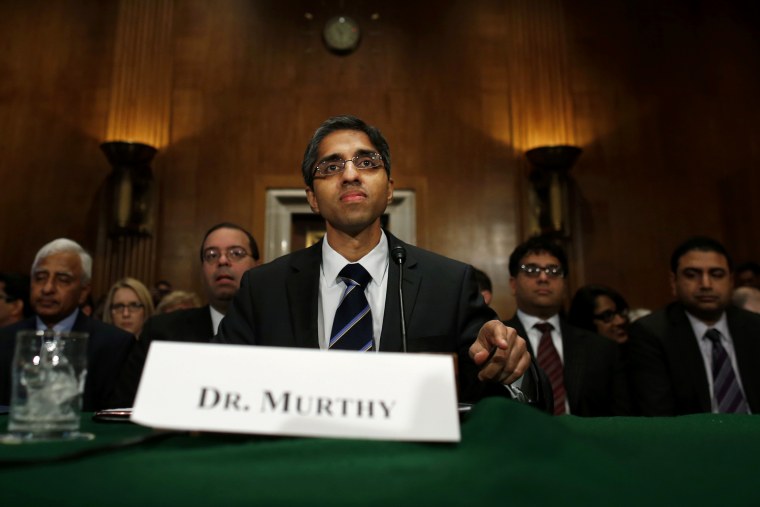Here we go again. Another high level, exceptionally qualified Obama administration nominee is in jeopardy, simply for performing his job.
Last week Debo Adegbile, President Obama’s nominee to lead the Justice Department’s Civil Rights Division, lost his confirmation battle after a successful Republican campaign against him. Why? Adegbile had worked, at the appellant level, on the legal defense team of a convicted cop killer and successful persuaded a federal court not to reinstate the death penalty in that case. In other words, Adegbile was denied confirmation for a civil rights post, because he vigorously defended someone’s civil rights.
Sadly, Obama’s nominee for Surgeon General, Dr. Vivek Murthy, is now facing a difficult confirmation for defending public health by pushing for measures that would reduce gun violence in America.
Last week on a vote of 13-9, Murthy’s nomination passed through the Senate Health, Education, Labor and Pensions Committee. But his path forward to full confirmation is now under assault from the National Rifle Association, which penned a letter strongly opposing Murthy as Surgeon General. Sen. Rand Paul has threatened to put a hold on the nomination and Sen. John Barrasso has come out against confirmation.
At issue is a letter sent to members of Congress by Murthy, a co-founder of the national grassroots health care advocacy group Doctors for America. “As health care professionals who are confronted with the human cost of gun violence every day, we are unwavering in our belief that strong measures to reduce gun violence must be taken immediately. We strongly urge Congress and theObama administration to put legislation in place now and develop a comprehensive plan to reduce gun-related injuries and deaths,” Murthy wrote.
He pointed out in the letter that 100,000 people are killed or injured by guns in America every year. It is a statement of fact that gun violence is a public health concern. According to a report by the Center for American Progress, gun deaths will surpass car accident deaths among young people next year. Murthy’s view is not controversial within the public health community. The American Medical Association officially opposes any laws that would block doctors from having open conversations about firearm safety in the home and the Academy of Pediatrics has recommended specific gun violence prevention measures to Congress.
Murthy wouldn’t even be alone among Surgeons General connecting gun violence to public health. Dr. C. Everett Koop, who served as Surgeon General during the Reagan administration, spoke out about gun violence in an essay for the American Medical Association titled: “Time to Bite the Bullet Back.”
None of this has stopped the NRA and pro-gun senators from attacking Murthy for his commitment to dealing with gun violence. In a letter to Senate Majority Leader Harry Reid explaining why he would block Murthy’s confirmation, Paul wrote: “Dr. Murthy has disqualified himself from being Surgeon General because of his intent to use that position to launch an attack on Americans' right to own a firearm under the guise of a public health and safety campaign.” Murthy has no such intent. In fact, he clearly stated during his confirmation hearing that his focus as Surgeon General would be on fighting obesity. The NRA, for its part, has indicated that they will score the vote on Murthy’s confirmation, a pressure tactic aimed at pro-gun Senators in both parties.
While they may oppose his position on gun violence, Murthy is highly qualified and strongly supported within the medical and public health community. He is an attending physician at Boston’s Brigham and Women’s Hospital and is also an instructor at Harvard Medical School. He has been an entrepreneurial leader in health care technology. Murthy, whose parents are from India, earned a science degree from Harvard, a medical degree from Yale University and an MBA in health care management, also from Yale.
He has written about H.I.V. prevention and led a non-profit service organization that worked in India and the United States.
Dr. David Satcher, former surgeon general under Presidents Bill Clinton and George W. Bush, wrote in a letter of support that: “The American people look to the Office of the Surgeon General for credible information based on the best available public health science, not politics, not religion, and not personal opinion. I have faith that as Surgeon General, Dr. Murthy can continue to carry this torch to fulfill a sacred trust with the American people.” Leading public health organizations including The American Academy of Pediatrics, the American Heart Association and the American Public Health Association all support Murthy’s confirmation for Surgeon General of the United States.
Under new Senate rules, Murthy could be confirmed with a simple majority. That means that even if all Republicans oppose his confirmation, he could still get through. But, as was the case with Debo Adegbile, the pressure once again falls on vulnerable red state Democrats facing tough re-elections. Will they find the courage to do the right thing this time and confirm an eminently qualified nominee? Or will Murthy suffer the same fate as Adegbile, undone by the fear of election year attack ads and powerful NRA opposition? A full Senate vote is expected in late March or early April. Here’s hoping that this time courage prevails.
